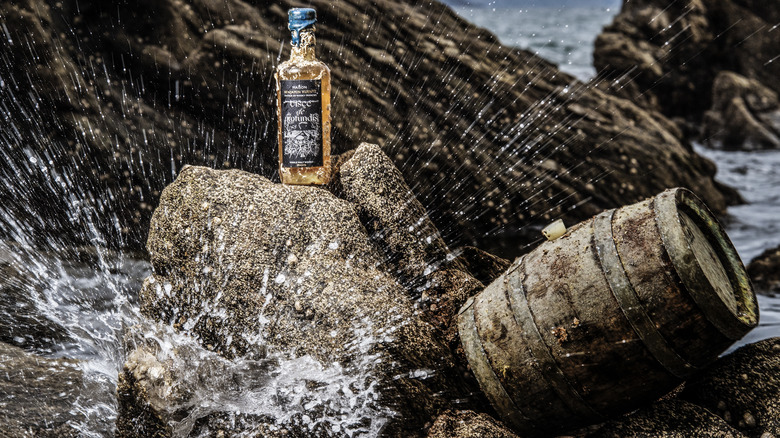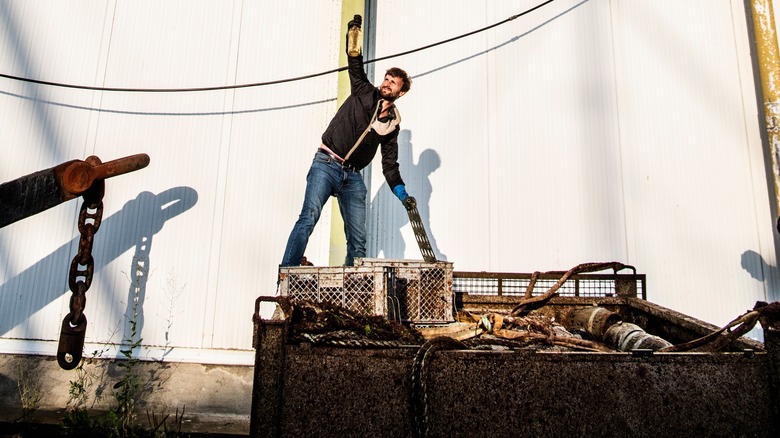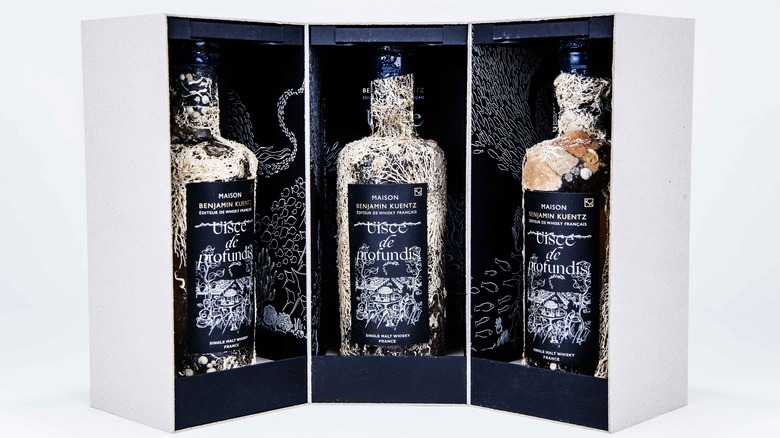Why More Distilleries Are Aging Liquor Underwater
Jefferson's Ocean Aged at Sea had an interesting concept when it was first bottled in 2012. Whiskey-filled barrels of Kentucky bourbon would be aged on ocean-going ships — as they were on shipping boats in centuries past — exposing the liquor to constant movement and variable temperatures, and in the process, adding a new layer of caramelized complexity to the product. The first releases were a rousing success, but the concept no longer seems so unusual today. Not only have more wineries and distilleries embraced sea aging, but in some cases, the latter are aging their spirits underwater.
One thing these distillers agree on is that underwater storage has produced remarkable results in terms of flavor and aroma. Benjamin Kuentz's Maison Benjamin Kuentz is taking French whiskies and aging them underwater at a depth of 65 feet off the coast of Brittany in France, resulting in products like their Uisce de Profundis amber-gold whiskey.
"Uisce de Profundis is a story that could have been written in a Jules Verne novel," Kuentz told Food Republic. "I was really curious to test if there could be any impact on my whisky in sea aging. And the answer was definitely YES. I was surprised when I tasted the magical flavors I had discovered after a one-year finishing process of my bottles under the ocean. Actually, changing pressure brings specific aromas and texture coming from the sea."
What happens when liquor is aged underwater
Wine and liquor have different flavor profiles, of course, but underwater aging seems to have noteworthy effects on both. Patricia Ortiz, a Malbec producer from Argentina, told Decanter, "We tasted the underwater-aged wine and the cellar-aged counterparts blind, the difference was stunning: the former was rounder, more elegant, and with fresher fruit."
Distillers like Benjamin Kuentz have also noted a difference in taste and aroma after underwater aging. The characteristic note is a sort of briny salinity, which is not surprising, given where the bottles or barrels have been stored. In fact, Kuentz recommends pairing his gourmet whisky with seafood. But other factors also come into play with the underwater aging process. Cooler temperatures and changes in depth and hydrostatic pressure seem to accelerate the maturation of liquors, imparting more complex flavors.
Enhanced exposure to oak is another notable effect, at least with underwater barrel aging. Because of the motion of seas and tides, the barrel contents are agitated and in frequent contact with more of the wood's surface area. This near-constant agitation, as well as a greater concentration of oxygen due to ever-changing levels of depth and water pressure, can produce a deeper color, in addition to more profound flavors and aromas.
Distilleries that have dived into underwater aging
Maison Benjamin Kuentz isn't the only distiller aging liquor off the coast of Brittany, France. Emperor Deep Blue, a rum brand from the Lookout Beverages Group, is doing the same thing for its Deep Blue Edition. The company is aging bottles, not barrels, for six months at depths of 200 feet near offshore islands. France, in fact, has become the world's hotspot for underwater aging. In addition to whisky and rum, Champagne and Cognac are also being aged underwater there.
Portugal, not France, once governed the Azores island chain, where briny and botanical gin distiller Baleia once aged its own limited-edition barnacled bottles in the Atlantic Ocean, with no limit on the aging period. Visitors were invited to dive down to put the bottles in cool storage, then retrieve them whenever they were in the area again. Baleia, which is Portuguese for "whale," is a name well-chosen. Sales helped to benefit the nine islands and their whale protection efforts.
Given the rich character and complexity attributed to these liquors, you might think that U.S. distilleries would engage in underwater aging, too. But legal prohibitions for underwater wine aging have thus far proven impossible to surmount, and seem to have discouraged undersea liquor aging in America.



